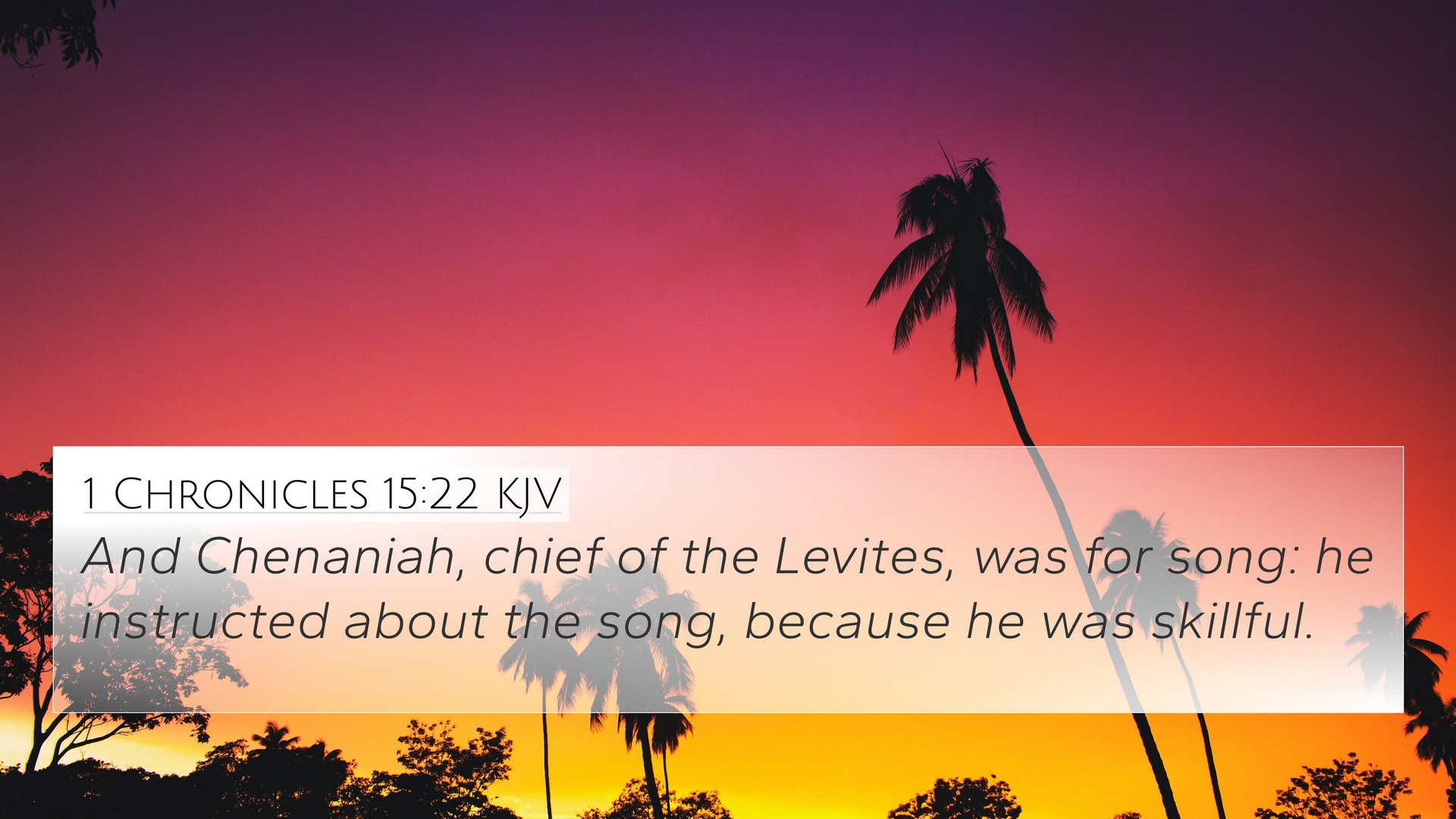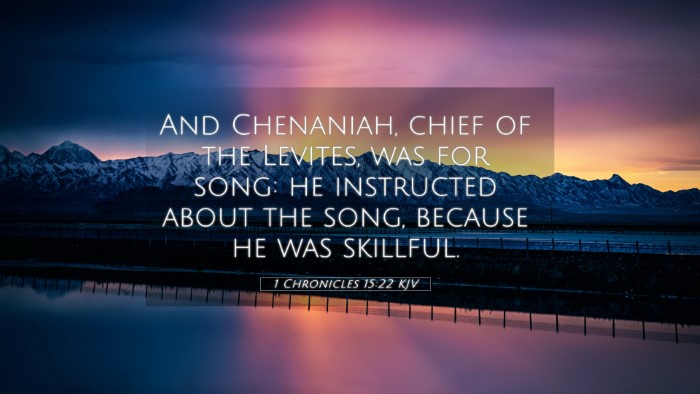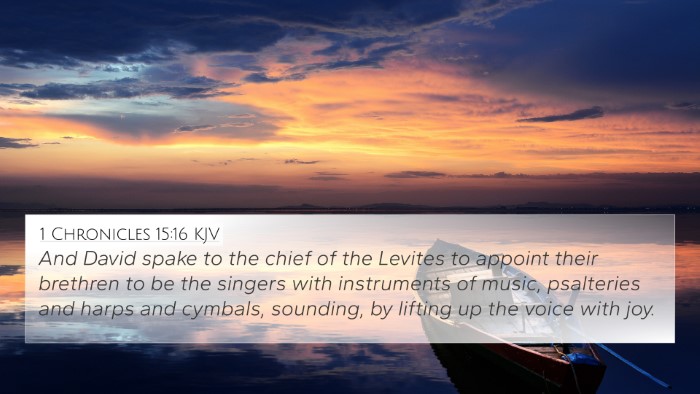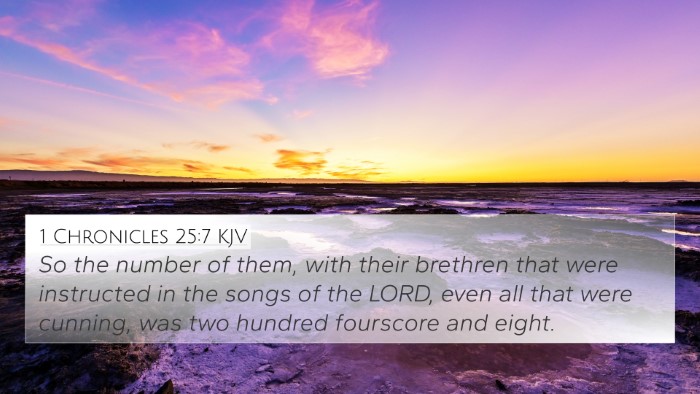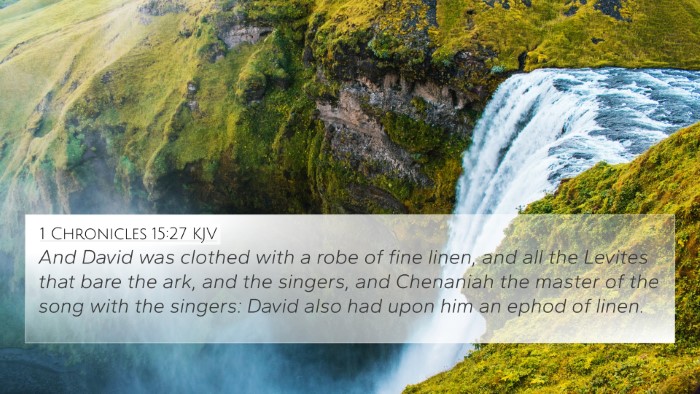1 Chronicles 15:22 - Verse Meaning Summary
In 1 Chronicles 15:22, the verse states: "And Chenaniah, chief of the Levites, was for song: he instructed about the song, because he was skillful." This passage touches upon the organization of worship in ancient Israel, emphasizing the crucial role of music in expressing devotion and leading worship effectively.
Contextual Insight
This verse is part of a larger narrative where David is bringing the Ark of the Covenant to Jerusalem. The organization of the Levitical priests and their duties, including singers, reflects David's intent to establish a structured approach to worship. Matthew Henry notes that this reflects a dedication to enhancing the spiritual life of the nation through worship.
Role of Chenaniah
Chenaniah is highlighted as a skilled leader, indicating that not just any person could lead worship; skill and training are necessary for this vital service. Albert Barnes comments that his role was essential as he taught others about the song, emphasizing the need for preparation in worship activities.
Music and Worship
Adam Clarke observes that music was an integral component of ancient worship practices in Israel. The mention of skillfulness suggests that worship, particularly through song, was not merely spontaneous but required training, preparation, and anointing.
Common Themes in Worship
1 Chronicles 15:22 connects with various Bible verses that explore the themes of worship, music, and the training required for leading these aspects within the community. Notable cross-references include:
- Psalm 33:3: "Sing to him a new song; play skillfully, and shout for joy." - This reinforces the importance of skill in worship.
- 1 Chronicles 16:41-42: Discusses the role of singers in worship, tying back to the Levitical duties.
- Colossians 3:16: "Let the word of Christ dwell in you richly...singing psalms and hymns..." - Highlights the continuity of music in Christian worship.
- 2 Samuel 6:5: The singing and dancing before the Lord as the Ark is brought to Jerusalem resonates with the themes of joyful worship.
- Ezra 3:10: The singing of praises as the foundation of the temple is laid emphasizes the historical significance of song in worship.
- Psalm 147:7: "Sing to the Lord with thanksgiving; make music to our God on the harp." - A direct correlation to musical worship.
- Isaiah 12:5: Exhorts singing praises to God for His greatness, illustrating the joy of worship.
- 1 Corinthians 14:15: Paul discusses the importance of the spirit while singing, relating to the essence of worship.
- Revelation 5:9-10: The heavenly choir emphasizes the eternal significance of praise through music.
Conclusions and Further Thought
Understanding 1 Chronicles 15:22 requires a deep dive into the Old Testament’s approach to worship, music's role, and the necessity for skillful leadership in spiritual matters. Connections between Bible verses, such as those noted above, enrich our comprehension and highlight the timeless nature of worship, as seen in both the Old and New Testaments.
Tools for Bible Cross-Referencing
To delve deeper into these themes, utilizing tools like concordances, cross-reference guides, and Bible study methods can enhance your exploration of scripture. Learning how to identify connections between Biblical texts aids in recognizing thematic parallels and the inter-Biblical dialogue, offering insight into God's ongoing narrative throughout history.
Additional Reflection
Let us reflect on how the skillfulness in worship as exemplified by Chenaniah applies to our own practices today. Whether in communal service or personal devotion, the quality of our worship and the preparation we undertake to lead others can significantly impact our spiritual journey and that of the community.
